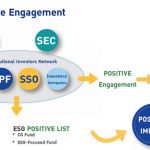GPF Aims To Be the Leader in ESG Investing and Initiatives in Thailand
Under the leadership of Mr Vitai Ratanakorn, Secretary General, Thailand’s Government Pension Fund (GPF) has taken a new approach to ‘Doing well by Doing Good’ through ESG Investing.
“His ambition is high. He wants GPF to be the leader in ESG investing and initiatives in Thailand”, Srikanya, GPF’s Deputy Secretary General told CFI.co in a recent telephone interview.
“There is no compromise in sacrifying social values through financial values or the other way around. We must achieve both. As a pension fund, our investment is long-term enough to generate both the social values and financial values. Creating social values is not an option but a mandate for pension fund like us.” Srikanya recalled a speech Mr Vitai gave to key executives late last year.
“My boss [Mr Vitai] pays most of his attention to ESG investing”, Srikanya said, “it was rather slow in the beginning to get everyone involved. The misperception that ESG investing would have to sacrifice alpha makes many reluctant to focus on it. After repeated internal communication and workshops supported by PRI and OECD, our investment team put their shoulders to the wheel”, Srikanya said.
“The first movement in ESG investing was my boss’s initiative to launch ESG-focused portfolio in October 2018. We set aside approximately THB 1 billion ($3.3m) to invest in 33 listed companies in the Thailand Sustainability Investment List. GPF’s ESG-focused portfolio is the first ESG fund in Thailand. The move has made the mark for GPF toward leadership in ESG Investing and Initiatives in Thailand.”
The setting up of the ESG-focused portfolio is just a first step, Mr Vitai has initiated. His plan is by the end of 2019, GPF must have its own ESG scoring tool to evaluate investment opportunities in Thai stocks and bonds.
His 2020’s plan is even more challenging. By the first quarter of 2020, he targets to use ESG lenses for GPF’s investment in all Thai equity. All must be screened, to ascertain that GPF will not have companies with corrupt ESG track records in its portfolio.
Mr Vitai’s stroke of genius was to initiate a project so-called ‘Negative List Guideline’, Srikanya said. The project was developed on a conviction that collaborative engagement would enhance investors’ influence and improve efficiency of the engagement process.
“His idea of negative list guideline has gained a tremendous response. We have as many as 32 institution investors signed MOU to become a signatory to the guideline. The agreement is if a Thai listed company breaches good practices in ESG issues, all signatories will discuss firstly on positive engagement.”
Representative from the signatories will have a dialogue with the company in question. If the dialogue turns positive and the issues are solved, no action would be taken. The company in question will be sanctioned by investment-pending from the signatories only when the issues are proven having breached ESG practices and yielded damages to stakeholders. The name of the company will then be on the negative list. i
About GPF
GPF was established in 1997 as an institutional investor for reserved fund and plan members’ saving fund. Total AUM is THB 937 mil.; in which THB 394 mil is Members’ saving fund and the rest is reserved fund.
You may have an interest in also reading…
Norvestor: A Sustainable Long-Term Value Proposition in Private Equity
The disclosure of environmental, social, and governance (ESG) practices by private equity funds has been associated with a 4.9 percent
Access by Name, Access by Nature: Bank Building Bridges and Solid Relationships
The Access Bank UK Ltd, a wholly-owned subsidiary of Access Bank Plc, a Nigerian Stock Exchange-listed company, provides trade finance,
Tadau Energy: Set the Controls for the Heart of the Sun – Ultimate Energy Solution is Finding Traction
A strong focus on green and sustainability and to provide environmentally-friendly and cost-effective alternative to conventional power plants has always

























































































